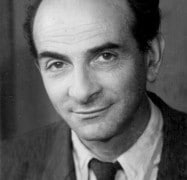The composer who’s still under a German state ban
mainMichael Haas has come up with the extraordinary story of Hans Winterberg, a Prague Jew who was held in Terezín by the Nazis and kept there afterwards by the Czech as a Sudeten German. In 1947, he was resettled in Bavaria.
On his death in 1991 Winterberg’s heir, the son of his fourth wife, gave his estate to a German state archive on the unusual condition that all enquiries were to be answered in the negative, especially to any living relatives, until the year 2031. The music was effectively silenced.
Now a grandson has turned up who is trying to overturn the ban on access to Winterberg’s music, some of which is of high quality.
Read Michael Haas’s research here. There are some music clips embedded in the piece.






I found Mr. Hass’s article interesting, but confusing to read, so I might not correctly understand some of his information. The history of the Sudenten Germans both before and after the war might help explain the odd contract with Sudenten German Music Institute. It not only suppresses Hans Winterberg’s compositions until 2031, it stipulates that must be referred to as a Sudenten German composer, and that it cannot be mentioned that he is Jewish.
The Sudenten Germans as a whole strongly embraced Hitler and were seen as traitors by their fellow Czechs. The Nazis not only planned to unite all ethnic Germans in Eastern Europe, they also planned to exterminate the Slavic people and colonize their lands with Germans at least as far as the Ural mountains. The Eastern front thus became a war of extermination. 27 million people were killed in the Soviet Union. Six million in Poland, which was one fifth of the population. Over one fifth of the Ukraine’s population of 40 million was killed, including 1.7 million soldiers and 7 million citizens. In the first months of the invasion, Germany captured 3 million Soviet POWs and systematically killed them all through starvation and slave labor. Many other examples in other countries could be listed.
These events create an enormous hatred toward Germany after the war, with the result that 14 million ethnic Germans were forced to leave their homes in Eastern Europe and relocate in Germany. All of their property was confiscated, and many died horrific deaths in the forced marches, including many children.
To this day influential Sudenten groups in Germany are demanding the return of their former lands in the Czech Republic. This has created tension between the German and Czech governments. The Sudenten Germans have develop strong political and cultural programs to preserve their identity and press their claims for the repatriation of their lands. These issues have been further complicated because some Sudenten groups developed ties to far right groups.
I cannot at all be certain, but these events might explain the stipulation that Hans Winterberg be referred to as a Sudenten German composer, and his Jewish background suppressed. Perhaps his work is being instrumentalized as part of a larger Sudenten ethnic and nationalist agenda. I stress, however, that I can only speculate.
My original post hasn’t yet appeared, but I wanted to note the Sudeten German Music Institute, though funded in part publicly, is a private organization. The state is not responsible for the contract in question. I think the contract might even be found illegal under Germany’s laws for racial discrimination. Also, an error in my spell checker misspelled Sudeten in my original comment.
I’m sorry that William Osborne found my article confusing. Many of those who have read and contacted me appear not to have been confused: the one thing, however, that Mr. Osborne confuses is the fact that the SMI is only a ‘private’ organisation. This is patently untrue as even a cursory visit to the website demonstrates. It is indeed publicly funded by the local district of the Oberpfalz. It may receive private funds as well, but it is primarily a public institution.
Mr. Haas is correct. The SMI is owned and operated by the Bizirk of Oberpfalz. Bavaria groups its counties into 7 Bizirks. Oberpfalz is in the northeast and shares a border with the Czech Republic. I had assumed it was part of the Sudentendeutsche Landsmannschaft, a large organization whose mission is to represent the interests of the 3 million Sudeten Germans who were expelled to Germany.
There are about one million Sudeten Germans and descendants living in Bavaria – about 8% of the state’s population. They wield a lot of political power, so it should be expected that some of their cultural institutions are public.
Last February, the Sudentendeutsche Landsmannschaft voted to renounce its claims for the return of lands in the Czech Republic, and all claims for compensation. It also included an official declaration acknowledging the responsibility of Sudeten Germans for the persecution and murder of Sudeten Germans and Czechs who opposed National Socialism, and for their role in the Holocaust.
Mr. Haas, is there anything known about Christoph Winterberg’s motives behind this strange contract? And what puzzles me the most: How did this bilateral contract between Mr. Winterberg and the SMI get to Mr. E. Randol Schoenberg?
The music is the usual angstridden, dark soundworld of 20C catastrophe like Shostakovich’s, and represents its dark age character better than the usual suspects (Stockhausen, Nono, etc.)
the ban did not come from the ‘German state’ but from a ‘family’ member….
In answer to Patrick Schönbach: Peter Kreitmeir was able to prove his blood relationship with Hans Winterberg and obtain the contract from the present, apparently sympathetic administration of the SMI. I’m guessing that he simply contacted Randol Schoenberg on the off chance he could help, given his existing profile in questions of looted art and his own musical family background. Frankly, I would need to ask Peter how he came up with the idea of contacting Schoenberg. Randy and I have known each other since the early ‘90s when he was still a budding lawyer in Los Angeles and keen to get music ‘by his other grandfather’ (Eric Zeisl) recorded and performed. He sent me, unsolicited the score of ‘Requiem Ebraico’ which I then included in Decca’s ‘Entartete Musik’ recording series. We have remained in touch ever since, and when I was music curator of Vienna’s Jewish Museum, he was kind enough to put me up for a couple of weeks while I researched Erich Korngold documentation at Warner Bros. and UCLA. Randy forwarded the contract to me, told me he found the situation quite unbelievable and suggested it would be worth writing about. Not until I made contact with Peter Kreitmeir did I have a chance to hear the music and find out about the background. The motives of Christoph Winterberg are as puzzling to Peter Kreitmeir, (who appears to have a constructive relationship with his uncle) as they are to the rest of us. Peter puts it all down to fear and the damage of growing up the child of one of the dispossessed. The so-called ‘Todesmarsch’ (March of Death) that left 250,000 ethnic Germans dead as they were forcibly marched out of Eastern Europe would, one presumes, have permeated every aspect of his young life. The reason to ban any mention of Winterberg being a Jew is completely unclear, and apparently Christoph Winterberg is such a complex individual, that naked anti-Semitism is probably too simplistic an answer. It possibly has to do with ‘identity’ and an attempt to shore up a specific identity by removing all subsidiary identities that may get in the way. But this is speculation on my part, and it doesn’t explain his wish to suppress the music until 2031. I doubt that Peter Kreitmeir can add much more, though I’m sure he would be very willing to address these issues to anyone interested: peter@kreitmeir.de
Thanks for your interest.
Michael Haas
One should bear in mind that the stipulation against mentioning that Hans Winterberg was Jewish is linked in the contract to the stipulation that he *must* be referred to as a Sudeten German composer. The Sudeten Germans had a long history of association with National Socialism. After the Czech government banned the Nazi Party in 1933, the closely related Sudetendeutsche Heimatfront was founded. In 1935 they changed their name to the Sudetendeutsche Partei.
In September 1938 the policy of SdP succeeded in the German annexation of Sudetenland according to the Munich Accords. On October 1, the party’s leader, Konrad Henlein, was appointed Reichskommissar of the incorporated territories, which became the Reichsgau Sudetenland. Heinlein also became a member of the SS.
After the war, the close ties between many Sudeten Germans and far-right parties continued, and have only begun to soften in recent years. We can’t prove why a contract was made that forbids mention that Hans Winterberg is Jewish and that he must be referred to as a Sudeten German, but the historical context presents troubling implications.
Here is some documentation and examples of the well-known Nazi associations of some Sudeten German groups. The Witikobund is an organization of Sudeten Germans that the German Federal government has classified as a rightwing extremist group since 1967. Most of its leadership has ties to the German Nazi Party (NPD):
http://de.wikipedia.org/wiki/Witikobund
Here is a Facebook page of the NPD denouncing the recent decision of the Sudetendeutsche Landsmannschaft to renounce its claims to land and reparations in the Czech Republik.
https://www.facebook.com/npdbayern/posts/896890100352142
Below is a neo-Nazi YouTube video that also denounces the recent decision. Even if you don’t speak German, the intro alone is enough to give you a sense of the mindset behind the group the video represents. Notice in the comments the pseudonyms such as “Ich kämpfte gegen die Juden”:
https://www.youtube.com/watch?v=d9tSIjcr0RA&feature=youtu.be
If naked anti-Semitism could be proven, then it may be easier to have the contract declared invalid. But I’m no lawyer, so can only speculate. I’m going on the information I have from Peter Kreitmeir though my initial reaction, and the initial reaction of Randol Schoenberg, was anti-Semitism behind an effort to suppress the music and life of Hans Winterberg. Peter has appeared to suggest that the issues are in fact more nuanced, with immediate family survivors, such as his mother (Winterberg’s daughter) and Christoph Winterberg, being seriously damaged individuals through a degree of debilitating ‘fear’ that senses danger in all sorts of things where no danger exists. In the case of Christoph Winterberg, it includes the fear of Winterberg being possibly seen as a Jewish composer. Why every aspect of his life should be barred from the public remains a mystery, and perhaps anti-Semitism is the only logical explanation.
Though not the norm, it’s not unusual for Jewish people in Germany to hide their ethnicity out of fear. Between 2008 and 2013 there were 80 attacks on synagogues in Germany. Some were anti-Israel and some anti-Semitic. In some cases it’s difficult for the community to find the balance between justified and unjustified fear. Both are destructive. In the case of the SMI contract it would seem the justifications could go either way.
The video is quite shocking – especially towards the end when an anti-Semitic character is shown popping out of the back pocket of an American general with lots of money. I inadvertently let this maniac carry on to his next video. Quite apart from the fact that his final video image is a declaration of Germania Reconquista! – his next video is called ‘Why Austria is a part of Germany’!
Just to avoid any confusion: there can be no doubt that Christoph Winterberg is NOT Jewish – indeed, there’s speculation that his biological father was even a member of the SS. Hans Winterberg, on the other hand, never went out of his way to deny being Jewish and his studies and association with Alois Haba right up through 1940 would suggest that similar with other German-Jewish Czechs, such as Erwin Schulhoff, Hans Krasa and Pavel Haas, he was happy with Czech citizenship, while identifying himself as culturally German. In bilingual Czechoslovakia, and in the 1929 census, one was required to state to which cultural grouping one belonged: Slav-Czech or German-Czech. The two were no more mutually exclusive than being Swiss French or Swiss German. That German-Czechs in the Sudetenland, Moravia and Bohemia welcomed Hitler does not diminish in the slightest the fact that Czech Jews did not. The confusion arises as most Czech Jews identified themselves as ‘culturally German’ and spoke German as their first language. Hans Winterberg spoke openly about being ‘a bridge between the German culture and the East and a bridge between German and Slav culture’. This is hardly the language of the Nazi-sympathising Sudeten-German yet would appear to be the aspect of Hans Winterberg that his adopted son, Christoph, wishes to suppress.
Even the name Sudetendeutscher has a complicated history. It was only after WWI that the term quickly gained ground after Czech officials forbade the terms Deutschböhmen, Deutschmährer, and Deutschschlesier. After WWII the term became so closely associated with revanchism that many descendants avoid it. In the Czech Republic it is almost entirely avoided. The preferred alternative terms now in use are Deutschböhmen oder Deutschmährer. This might reveal the political agenda behind the stipulation that Hans Winterberg be labeled a Sudetendeutscher.
There will be a performance of Winterberg’s Suite for Winds and Piano (1959) on Wednesday, November 15, 2017 at the University of Arizona’s Fred Fox School of Music, performed by members of the Arizona Wind Quintet (Brian Luce, flute, Sara Fraker, oboe, Jackie Glazier, clarinet and William Dietz, bassoon with Rex Woods, piano.